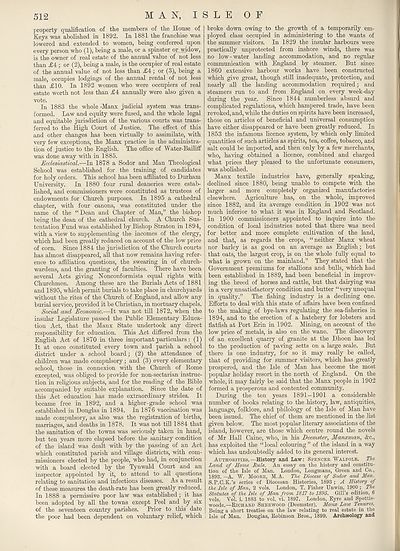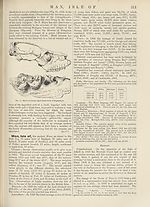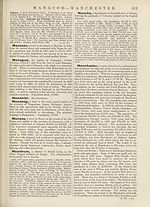New volumes of the Encyclopædia Britannica > Volume 30, K-MOR
(544) Page 512
Download files
Complete book:
Individual page:
Thumbnail gallery: Grid view | List view

MAN, ISLE OF
512
property qualification of the members of the House of
Keys was abolished in 1892. In 1881 the franchise was
lowered and extended to women, being conferred upon
every person who (1), being a male, or a spinster or widow,
is the owner of real estate of the annual value of not less
than £4 ; or (2), being a male, is the occupier of real estate
of the annual value of not less than £4; or (3), being a
male, occupies lodgings of the annual rental of not less
than £10. In 1892 women who were occupiers of real
estate worth not less than £4 annually were also given a
vote.
In 1883 the whole ‘Manx judicial system was trans¬
formed. Law and equity were fused, and the whole legal
and equitable jurisdiction of the various courts was trans¬
ferred to the High Court of Justice. The effect of this
and other changes has been virtually to assimilate, with
very few exceptions, the Manx practice in the administra¬
tion of justice to the English. The office of Water-Bailiff
was done away with in 1885.
Ecclesiastical.—In 1878 a Sodor and Man Theological
School was established for the training of candidates
for holy orders. This school has been affiliated to Durham
University. In 1880 four rural deaneries were estab¬
lished, and commissioners were constituted as trustees of
endowments for Church purposes. In 1895 a cathedral
chapter, with four canons, was constituted under the
name of the “Dean and Chapter of Man,” the bishop
being the dean of the cathedral church. A Church Sus-
tentation Fund was established by Bishop Straton in 1894,
with a view to supplementing the incomes of the clergy,
which had been greatly reduced on account of the low price
of corn. Since 1884 the jurisdiction of the Church courts
has almost disappeared, all that now remains having refer¬
ence to affiliation questions, the swearing in of church¬
wardens, and the granting of faculties. There have been
several Acts giving Nonconformists equal rights with
Churchmen. Among these are the Burials Acts of 1881
and 1895, which permit burials to take place in churchyards
without the rites of the Church of England, and allow any
burial service, provided it be Christian, in mortuary chapels.
Social and Economic.—It was not till 1872, when the
insular Legislature passed the Public Elementary Educa¬
tion Act, that the Manx State undertook any direct
responsibility for education. This Act differed from the
English Act of 1870 in three important particulars: (1)
It at once constituted every town and parish a school
district under a school board; (2) the attendance of
children was made compulsory; and (3) every elementary
school, those in connexion with the Church of Home
excepted, was obliged to provide for non-sectarian instruc¬
tion in religious subjects, and for the reading of the Bible
accompanied by suitable explanation. Since the date of
this Act education has made extraordinary strides. It
became free in 1892, and a higher-grade school was
established in Douglas in 1894. In 1876 vaccination was
made compulsory, as also was the registration of births,
marriages, and deaths in 1878. It was not till 1884 that
the sanitation of the towns was seriously taken in hand,
but ten years more elapsed before the sanitary condition
of the island was dealt with by the passing of an Act
which constituted parish and village districts, with com¬
missioners elected by the people, who had, in conjunction
with a board elected by the Tynwald Court and an
inspector appointed by it, to attend to all questions
relating to sanitation and infectious diseases. As a result
of these measures the death-rate has been greatly reduced.
In 1888 a permissive poor law was established; it has
been adopted by all the towns except Peel and by six
of the seventeen country parishes. Prior to this date
the poor had been dependent on voluntary relief, which
broke down owing to the growth of a temporarily em¬
ployed class occupied in administering to the wants of
the summer visitors. In 1829 the insular harbours were
practically unprotected from inshore winds, there was
no low-water landing accommodation, and no regular
communication with England by steamer. But since
1860 extensive harbour works have been constructed
which give great, though still inadequate, protection, and
nearly all the landing accommodation required; and
steamers run to and from England on every week-day
during the year. Since 1844 numberless absurd and
complicated regulations, which hampered trade, have been
revoked, and, while the duties on spirits have been increased,
those on articles of beneficial and universal consumption
have either disappeared or have been greatly reduced. In
1853 the infamous licence system, by which only limited
quantities of such articles as spirits, tea, coffee, tobacco, and
salt could be imported, and then only by a few merchants,
who, having obtained a licence, combined and charged
what prices they pleased to the unfortunate consumers,
was abolished.
Manx textile industries have, generally speaking,
declined since 1880, being unable to compete with the
larger and more completely organized manufactories
elsewhere. Agriculture has, on the whole, improved
since 1882, and its average condition in 1902 was not
much inferior to what it was in England and Scotland.
In 1900 commissioners appointed to inquire into the
condition of local industries noted that there was need
for better and more complete cultivation of the land,
and that, as regards the crops, “neither Manx wheat
nor barley is as good on an average as English; but
that oats, the largest crop, is on the whole fully equal to
what is grown on the mainland.” They stated that the
Government premiums for stallions and bulls, which had
been established in 1889, had been beneficial in improv¬
ing the breed of horses and cattle, but that dairying was
in a very unsatisfactory condition and butter “very unequal
in quality.” The fishing industry is a declining one.
Efforts to deal with this state of affairs have been confined
to the making of bye-laws regulating the sea-fisheries in
1894, and to the erection of a hatchery for lobsters and
flatfish at Port Erin in 1902. Mining, on account of the
low price of metals, is also on the wane. The discovery
of an excellent quarry of granite at the Dhoon has led
to the production of paving setts on a large scale. But
there is one industry, for so it may really be called,
that of providing for summer visitors, which has greatly
prospered, and the Isle of Man has become the most
popular holiday resort in the north of England. On the
whole, it may fairly be said that the Manx people in 1902
formed a prosperous and contented community.
During the ten years 1891-1901 a considerable
number of books relating to the history, law, antiquities,
language, folklore, and philology of the Isle of Man have
been issued. The chief of them are mentioned in the list
given below. The most popular literary associations of the
island, however, are those which centre round the novels
of Mr Hall Caine, who, in his Deemster, Manxman, &c.,
has exploited the “ local colouring ” of the island in a way
which has undoubtedly added to its general interest.
Authorities.—History and Law: Spencer Walpole. The
Land of Home Rule. An essay on the history and constitu¬
tion of the Isle of Man. London, Longmans, Green and Co.,
1893. —A. W. Moore, M.A. The Diocese of Sodor and Man.
S.P.C.K.’s series of Diocesan Histories, 1893 ; A History of
the Isle of Man, 2 vols. London, T. Fisher Unwin, 1900 ; The
Statutes of the Isle of Man from 1817 to 1895. Gill’s edition, 6
vols. Vol. i. 1883 to vol. vi. 1897. London, Eyre and Spottis-
woode.—Richard Sherwood (Deemster). Manx Law Tenures.
Being a short treatise on the law relating to real estate in the
Isle of Man. Douglas, Robinson Bros., 1899. Archaeology and
512
property qualification of the members of the House of
Keys was abolished in 1892. In 1881 the franchise was
lowered and extended to women, being conferred upon
every person who (1), being a male, or a spinster or widow,
is the owner of real estate of the annual value of not less
than £4 ; or (2), being a male, is the occupier of real estate
of the annual value of not less than £4; or (3), being a
male, occupies lodgings of the annual rental of not less
than £10. In 1892 women who were occupiers of real
estate worth not less than £4 annually were also given a
vote.
In 1883 the whole ‘Manx judicial system was trans¬
formed. Law and equity were fused, and the whole legal
and equitable jurisdiction of the various courts was trans¬
ferred to the High Court of Justice. The effect of this
and other changes has been virtually to assimilate, with
very few exceptions, the Manx practice in the administra¬
tion of justice to the English. The office of Water-Bailiff
was done away with in 1885.
Ecclesiastical.—In 1878 a Sodor and Man Theological
School was established for the training of candidates
for holy orders. This school has been affiliated to Durham
University. In 1880 four rural deaneries were estab¬
lished, and commissioners were constituted as trustees of
endowments for Church purposes. In 1895 a cathedral
chapter, with four canons, was constituted under the
name of the “Dean and Chapter of Man,” the bishop
being the dean of the cathedral church. A Church Sus-
tentation Fund was established by Bishop Straton in 1894,
with a view to supplementing the incomes of the clergy,
which had been greatly reduced on account of the low price
of corn. Since 1884 the jurisdiction of the Church courts
has almost disappeared, all that now remains having refer¬
ence to affiliation questions, the swearing in of church¬
wardens, and the granting of faculties. There have been
several Acts giving Nonconformists equal rights with
Churchmen. Among these are the Burials Acts of 1881
and 1895, which permit burials to take place in churchyards
without the rites of the Church of England, and allow any
burial service, provided it be Christian, in mortuary chapels.
Social and Economic.—It was not till 1872, when the
insular Legislature passed the Public Elementary Educa¬
tion Act, that the Manx State undertook any direct
responsibility for education. This Act differed from the
English Act of 1870 in three important particulars: (1)
It at once constituted every town and parish a school
district under a school board; (2) the attendance of
children was made compulsory; and (3) every elementary
school, those in connexion with the Church of Home
excepted, was obliged to provide for non-sectarian instruc¬
tion in religious subjects, and for the reading of the Bible
accompanied by suitable explanation. Since the date of
this Act education has made extraordinary strides. It
became free in 1892, and a higher-grade school was
established in Douglas in 1894. In 1876 vaccination was
made compulsory, as also was the registration of births,
marriages, and deaths in 1878. It was not till 1884 that
the sanitation of the towns was seriously taken in hand,
but ten years more elapsed before the sanitary condition
of the island was dealt with by the passing of an Act
which constituted parish and village districts, with com¬
missioners elected by the people, who had, in conjunction
with a board elected by the Tynwald Court and an
inspector appointed by it, to attend to all questions
relating to sanitation and infectious diseases. As a result
of these measures the death-rate has been greatly reduced.
In 1888 a permissive poor law was established; it has
been adopted by all the towns except Peel and by six
of the seventeen country parishes. Prior to this date
the poor had been dependent on voluntary relief, which
broke down owing to the growth of a temporarily em¬
ployed class occupied in administering to the wants of
the summer visitors. In 1829 the insular harbours were
practically unprotected from inshore winds, there was
no low-water landing accommodation, and no regular
communication with England by steamer. But since
1860 extensive harbour works have been constructed
which give great, though still inadequate, protection, and
nearly all the landing accommodation required; and
steamers run to and from England on every week-day
during the year. Since 1844 numberless absurd and
complicated regulations, which hampered trade, have been
revoked, and, while the duties on spirits have been increased,
those on articles of beneficial and universal consumption
have either disappeared or have been greatly reduced. In
1853 the infamous licence system, by which only limited
quantities of such articles as spirits, tea, coffee, tobacco, and
salt could be imported, and then only by a few merchants,
who, having obtained a licence, combined and charged
what prices they pleased to the unfortunate consumers,
was abolished.
Manx textile industries have, generally speaking,
declined since 1880, being unable to compete with the
larger and more completely organized manufactories
elsewhere. Agriculture has, on the whole, improved
since 1882, and its average condition in 1902 was not
much inferior to what it was in England and Scotland.
In 1900 commissioners appointed to inquire into the
condition of local industries noted that there was need
for better and more complete cultivation of the land,
and that, as regards the crops, “neither Manx wheat
nor barley is as good on an average as English; but
that oats, the largest crop, is on the whole fully equal to
what is grown on the mainland.” They stated that the
Government premiums for stallions and bulls, which had
been established in 1889, had been beneficial in improv¬
ing the breed of horses and cattle, but that dairying was
in a very unsatisfactory condition and butter “very unequal
in quality.” The fishing industry is a declining one.
Efforts to deal with this state of affairs have been confined
to the making of bye-laws regulating the sea-fisheries in
1894, and to the erection of a hatchery for lobsters and
flatfish at Port Erin in 1902. Mining, on account of the
low price of metals, is also on the wane. The discovery
of an excellent quarry of granite at the Dhoon has led
to the production of paving setts on a large scale. But
there is one industry, for so it may really be called,
that of providing for summer visitors, which has greatly
prospered, and the Isle of Man has become the most
popular holiday resort in the north of England. On the
whole, it may fairly be said that the Manx people in 1902
formed a prosperous and contented community.
During the ten years 1891-1901 a considerable
number of books relating to the history, law, antiquities,
language, folklore, and philology of the Isle of Man have
been issued. The chief of them are mentioned in the list
given below. The most popular literary associations of the
island, however, are those which centre round the novels
of Mr Hall Caine, who, in his Deemster, Manxman, &c.,
has exploited the “ local colouring ” of the island in a way
which has undoubtedly added to its general interest.
Authorities.—History and Law: Spencer Walpole. The
Land of Home Rule. An essay on the history and constitu¬
tion of the Isle of Man. London, Longmans, Green and Co.,
1893. —A. W. Moore, M.A. The Diocese of Sodor and Man.
S.P.C.K.’s series of Diocesan Histories, 1893 ; A History of
the Isle of Man, 2 vols. London, T. Fisher Unwin, 1900 ; The
Statutes of the Isle of Man from 1817 to 1895. Gill’s edition, 6
vols. Vol. i. 1883 to vol. vi. 1897. London, Eyre and Spottis-
woode.—Richard Sherwood (Deemster). Manx Law Tenures.
Being a short treatise on the law relating to real estate in the
Isle of Man. Douglas, Robinson Bros., 1899. Archaeology and
Set display mode to:
![]() Universal Viewer |
Universal Viewer | ![]() Mirador |
Large image | Transcription
Mirador |
Large image | Transcription
Images and transcriptions on this page, including medium image downloads, may be used under the Creative Commons Attribution 4.0 International Licence unless otherwise stated. ![]()
| Encyclopaedia Britannica > New volumes of the Encyclopædia Britannica > Volume 30, K-MOR > (544) Page 512 |
|---|
| Permanent URL | https://digital.nls.uk/193574573 |
|---|
| Attribution and copyright: |
|
|---|---|
| Shelfmark | EB.18 |
|---|---|
| Description | Ten editions of 'Encyclopaedia Britannica', issued from 1768-1903, in 231 volumes. Originally issued in 100 weekly parts (3 volumes) between 1768 and 1771 by publishers: Colin Macfarquhar and Andrew Bell (Edinburgh); editor: William Smellie: engraver: Andrew Bell. Expanded editions in the 19th century featured more volumes and contributions from leading experts in their fields. Managed and published in Edinburgh up to the 9th edition (25 volumes, from 1875-1889); the 10th edition (1902-1903) re-issued the 9th edition, with 11 supplementary volumes. |
|---|---|
| Additional NLS resources: |
|

